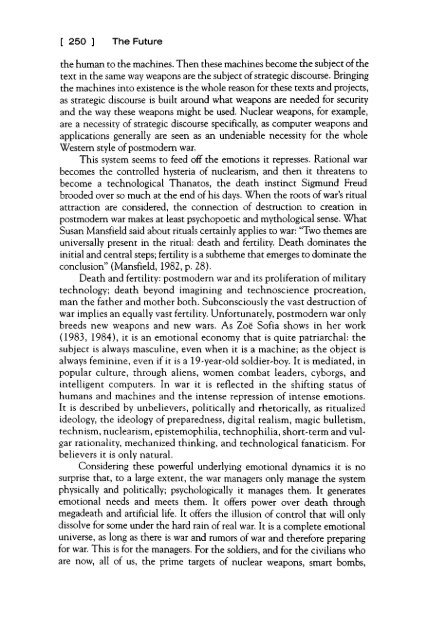entire book - Chris Hables Gray
entire book - Chris Hables Gray
entire book - Chris Hables Gray
Create successful ePaper yourself
Turn your PDF publications into a flip-book with our unique Google optimized e-Paper software.
[ 250 ] The Future<br />
the human to the machines. Then these machines become the subject of the<br />
text in the same way weapons are the subject of strategic discourse. Bringing<br />
the machines into existence is the whole reason for these texts and projects,<br />
as strategic discourse is built around what weapons are needed for security<br />
and the way these weapons might be used. Nuclear weapons, for example,<br />
are a necessity of strategic discourse specifically, as computer weapons and<br />
applications generally are seen as an undeniable necessity for the whole<br />
Western style of postmodern war.<br />
This system seems to feed off the emotions it represses. Rational war<br />
becomes the controlled hysteria of nuclearism, and then it threatens to<br />
become a technological Thanatos, the death instinct Sigmund Freud<br />
brooded over so much at the end of his days. When the roots of war's ritual<br />
attraction are considered, the connection of destruction to creation in<br />
postmodern war makes at least psychopoetic and mythological sense. What<br />
Susan Mansfield said about rituals certainly applies to war: "Two themes are<br />
universally present in the ritual: death and fertility. Death dominates the<br />
initial and central steps; fertility is a subtheme that emerges to dominate the<br />
conclusion" (Mansfield, 1982, p. 28).<br />
Death and fertility: postmodern war and its proliferation of military<br />
technology; death beyond imagining and technoscience procreation,<br />
man the father and mother both. Subconsciously the vast destruction of<br />
war implies an equally vast fertility. Unfortunately, postmodern war only<br />
breeds new weapons and new wars. As Zoe Sofia shows in her work<br />
(1983, 1984), it is an emotional economy that is quite patriarchal: the<br />
subject is always masculine, even when it is a machine; as the object is<br />
always feminine, even if it is a 19-year-old soldier-boy. It is mediated, in<br />
popular culture, through aliens, women combat leaders, cyborgs, and<br />
intelligent computers. In war it is reflected in the shifting status of<br />
humans and machines and the intense repression of intense emotions.<br />
It is described by unbelievers, politically and rhetorically, as ritualized<br />
ideology, the ideology of preparedness, digital realism, magic bulletism,<br />
technism, nuclearism, epistemophilia, technophilia, short-term and vulgar<br />
rationality, mechanized thinking, and technological fanaticism. For<br />
believers it is only natural.<br />
Considering these powerful underlying emotional dynamics it is no<br />
surprise that, to a large extent, the war managers only manage the system<br />
physically and politically; psychologically it manages them. It generates<br />
emotional needs and meets them. It offers power over death through<br />
megadeath and artificial life. It offers the illusion of control that will only<br />
dissolve for some under the hard rain of real war. It is a complete emotional<br />
universe, as long as there is war and rumors of war and therefore preparing<br />
for war. This is for the managers. For the soldiers, and for the civilians who<br />
are now, all of us, the prime targets of nuclear weapons, smart bombs,








